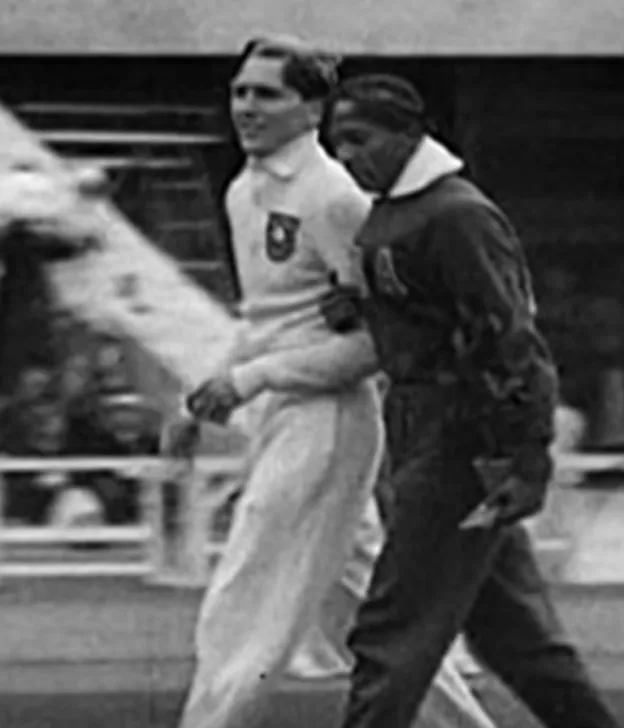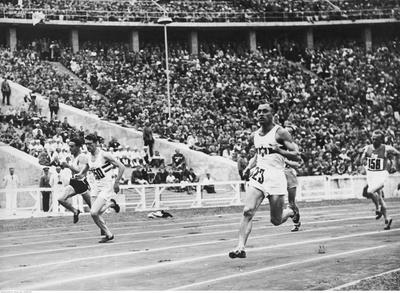
Don’t pass up your Olympics
The true friendship forged between Olympic rivals Jesse Owens and Luz Long. A story of the 1936 Olympics Games.
This was too much. I was mad, hate-mad, and it made me feel wild.
The American Olympic Champion Jesse Owens saw what lurked behind the parades and the pageantry, “Deutschland Über Alles,” and the despicable pretense of Aryan Supremacy: he saw that the leader of the Third Reich, Adolf Hitler, was a coward.

There Owens stood in Berlin, August 1936, the first week of the XI Olympiad. He admitted that the first foul on his first long-jump attempt was legitimate. The next foul, however, was not.
The truth is I didn’t foul at all on my second jump. I played it safe. Too safe.
The official shouted “Foul!” before Owens even hit the ground after his second jump.
Was the official fair?
Yeah. But a Nazi.
Returning to his starting position, Owens caught a glimpse of his nemesis. The embodiment of the Aryan ideal, blond-haired, blue-eyed German long jumper Luz Long, appeared to snicker with teammates at the unfair foul. Adding insult to injury, prior to his second foul, the host of the 1936 Olympics himself, Adolf Hitler, had left his seat to avoid watching Owens jump.
The son of sharecroppers and the grandson of enslaved Alabamians, Owens’ work ethic combined with his magnanimity portended an unbelievable athletic career. As a high schooler he won all the major track events, including the state championship three years in a row. Nicknamed the “Buckeye Bullet,” at Ohio State University, Owens broke three world records and tied another in one afternoon.
He accomplished these feats during a time of rampant segregation: he never received a college scholarship, never stayed in the same hotels as his white teammates, and despite serving as varsity captain, Owens was forced to live off campus.
Meanwhile, as the 1936 Berlin Olympics approached, many Americans urged the US to boycott the games. Initially, Owens sided with the boycott, stating in November 1935, “if there is discrimination against minorities in Germany, then we must withdraw from the Olympics.” Hitler and other Nazi officials, however, assured America that Jewish and Black athletes would receive equal treatment. These assurances from Hitler and his regime, anathema as they sound to us today, proved decisive: the American Amateur Union threw its weight behind the American Olympic Committee, effectively avoiding a US boycott. Owens committed to participating in the games, and responding to his critics, said “since we are all Americans, Negroes should have a chance in every sport. Certainly the showing of Negroes in track events shows that if they have half a chance, they produce the goods.”
Now in Berlin making his third and final attempt at the long-jump, Jesse Owens stood in “total” panic near his starting position. He couldn’t stop thinking about Hitler’s snub, the bogus foul, the smirk from his “worst enemy,” Luz Long…

I started to feel faint, began to gasp for breath. Instinctively, I turned away from everyone so they couldn’t see me.
Owens almost dropped to the ground in front of 100,000 chanting Germans, who he believed “hatefully, gleefully” wanted him to fail. Knees-shaking, he clenched his jaw to stop his thoughts from racing. And then it happened.
Suddenly I felt a firm hand on my arm. I turned and looked into the sky-blue eyes of my worst enemy.
Luz Long, the poster child for Hitler’s Aryan ideal, touched Jesse Owens, a Black man, in full view of the entire stadium. Like a family member, Long gently chided Owens: he knew that Hitler had insulted him, he knew the stakes, and he knew that he and Owens were essentially the same.
“I have thought,” Long told him, “You are like I am. You must do it one hundred percent. Correct?”
Owens nodded.
“Yet you must be sure not to foul.”
The loudspeaker announced Owens’ name to the crowd.
“Then you can do both things, Jesse. You re-measure your steps. You take off six inches behind the foul board. You jump as hard as you can. But you need not fear to foul.”

Sure enough, now with a towel carefully marking six inches before the takeoff board, he ran, jumped, and won the gold medal. By the end of the Olympics, Owens “produced the goods,” as his efforts contributed to four out of the United States’ eleven gold medals.
Long’s advice left an indelible mark on Owens. After he failed to beat Owens at the long jump, he raced over to Owens, grabbed his hand, and marched toward the stands chanting “Jesse Owens!” – in full view of Hitler, who had by now reappeared in the stands to watch Long’s performance.
Long and Owens became fast friends and spent many nights talking politics, philosophy, and sports in the Olympic Village. The German explained that although he did not subscribe to Hitler’s racial fanaticism, he loved his country and would fight for it. After the Olympics, they remained in touch. In 1939, Owens received a final letter from Long:
Things become more difficult and I am afraid, Jesse. Not just the thought of dying. It is that I may die for the wrong thing. But whatever might become of me, I hope only that my wife and son will stay alive. I am asking you who are my only friend outside of Germany, to someday visit them if you are able, to tell them about why I had to do this, and how the good times between us were. Luz.
Long died fighting for the German Wehrmacht after succumbing to wounds he received during the Allied invasion of Italy in 1943.
Reflecting on his experience in the long jump, Owens did not waste ink writing about Hitler: His lasting memory of the Olympics was the relationship he formed with Luz Long.
I loved Luz Long, as much as my own brothers. I still love Luz Long.
Their friendship came from what Owens described as “the priceless knowledge that the only bond worth anything between human beings is their humanness.” Owens recognized that if Long, a human being living in Nazi Germany, could walk arm-in-arm with him around the Olympic stadium in Berlin, then all humans could strive to recognize each other’s fundamental human equality and “be a human being first and last, if not always.” Jesse Owens continues to inspire us, as we long to realize the dreams offered by our nation’s founding principles. And lest we forget, Owens will advise us:
We all have dreams. But in order to make dreams come into reality, it takes an awful lot of determination, dedication, self-discipline, and effort.
(All italicized quotations, save for the final quotation, come from Jesse Owens’ 1971 book, Blackthink: My Life as Black Man & White Man)
Elliott Drago serves as the JMC’s Editorial Officer. He is a historian of American history and the author of Street Diplomacy: The Politics of Slavery and Freedom in Philadelphia, 1820-1850 (Johns-Hopkins University Press, 2022).
